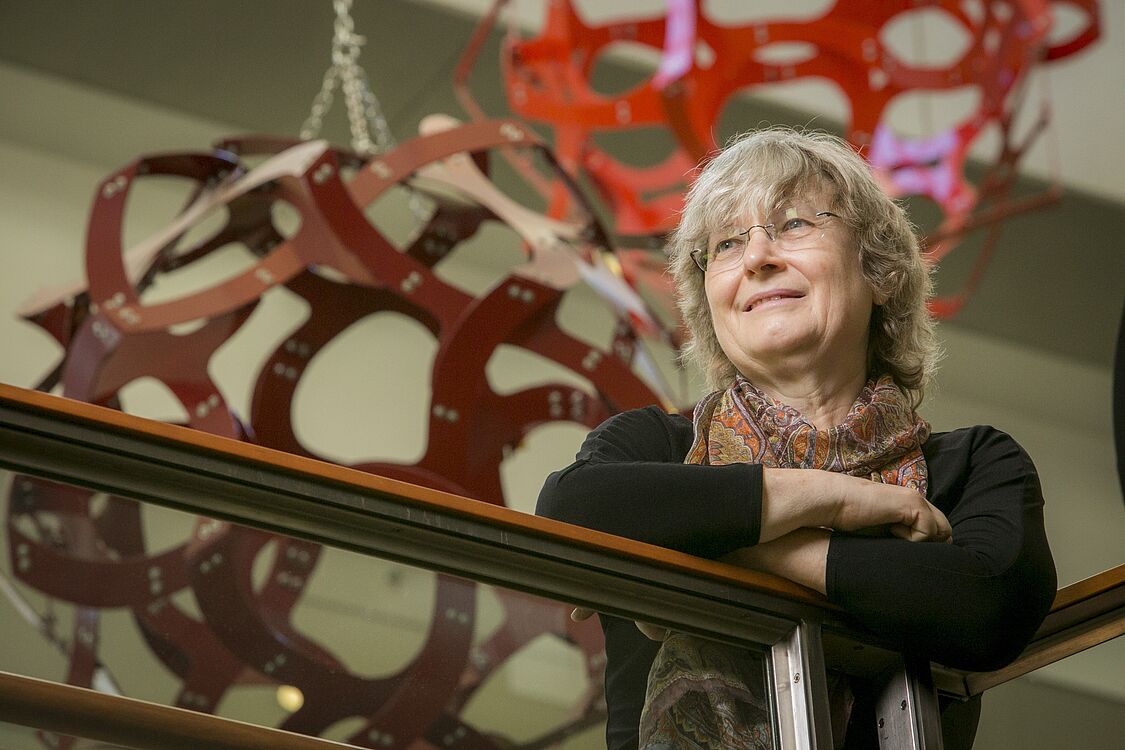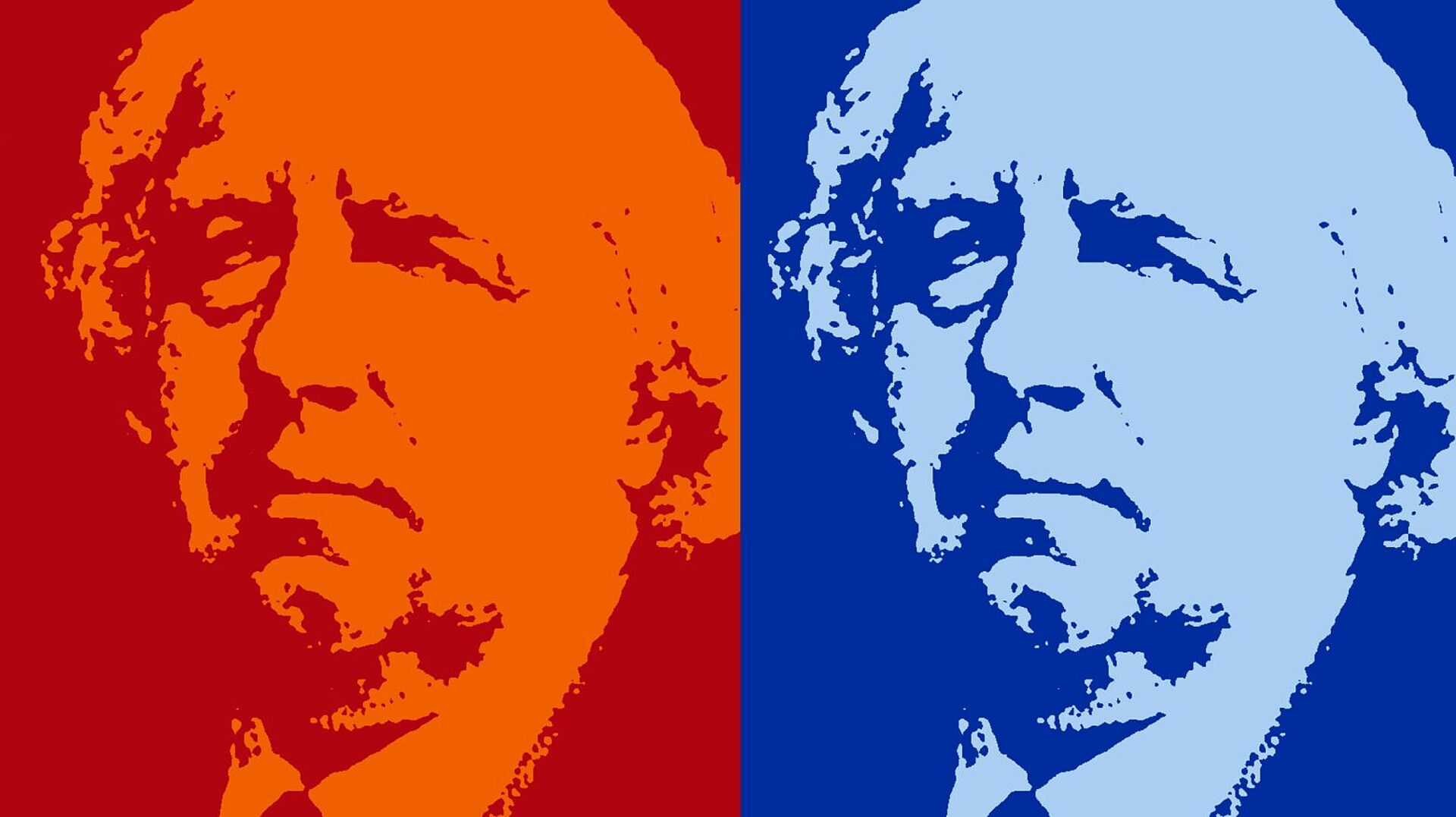Die Weierstraß-Vorlesung an der Universität Paderborn
Die Veranstaltungsreihe ist nach Karl Weierstraß (1815-1897) benannt. Er hat 1834 sein Abitur am Gymnasium Theodorianum in Paderborn als "primus omnium" erworben. Weierstraß zählt zu den bedeutendsten Mathematikern des 19. Jahrhunderts. Er gilt u. a. als Begründer der modernen Analysis.
Die „Weierstraß-Vorlesung in Paderborn“ besteht aus einem Festvortrag, dem „Weierstraß-Vortrag“, und einem einführenden historischen Vortrag. Die Vortragenden der Weierstraß-Vorlesung werden von einer unabhängigen Jury ausgewählt, der gegenwärtig die Professoren Martin Kolb (Paderborn), Gérard Laumon (Paris) und David Vogan (Cambridge, USA) angehören.
Weierstraß-Vorlesung 2025

Die Weierstraß-Vorlesung 2025 findet am 11. Juli 2025 um 16:00 im Hörsaal O1 statt. Für den Weierstraß-Vortrag freuen wir uns sehr, Prof. Ingrid Daubechies in Paderborn begrüßen zu dürfen. Prof. Daubechies ist James B. Duke Professor an der Duke University und war davor Professorin und Direktorin des Fachbereichs Mathematik der Princeton University. Die von ihr geleisteten fundamentalen Beiträge zur Theorie und Anwendung von Waveletmethoden ist in vielen Bereichen der angewandten Mathematik bis hin zu konkreten technischen Umsetzungen von fundamentaler Bedeutung. Für ihre Arbeit erhielt sie zahlreiche Auszeichnungen, wie zuletzt die National Medal of Science im Jahr 2025.
Mathematicians helping art conservators and art historians
In recent years, mathematical algorithms have helped art historians and art conservators putting together the thousands of fragments into which an unfortunate WWII bombing destroyed world famous frescos by Mantegna, decide that certain paintings by masters were "roll mates" (their canvases were cut from the same bolt), virtually remove artifacts in preparation for a restoration campaign, get more insight into paintings hidden underneath a visible one.
The presentation reviews these applications, and gives a glimpse into the mathematical aspects that make this possible.
Historischer Vortrag
Den historischen Vortrag hält Prof. Dr. Volker Peckhaus von der Universität Paderborn.
Karl Weierstrass and the Foundational Crises in Mathematics
The 19th century saw the emergence of mathematical logic which to some extent became part of the spectrum of mathematical disciplines, and a new interest in the foundations of mathematics driven not only by philosophers, but also by the mathematicians themselves. Weierstrass was ambivalent about these developments. There is no doubt that his new approach to analysis contributed significantly to the concept of number and thus to the philosophy of arithmetic, but he was rather sceptical about the new foundational set theory of his student Georg Cantor (1845–1918). Nevertheless, Weierstrass is mentioned in the context of the foundational crises in mathematics. Heinrich Scholz (1884–1956), the theologian, philosopher and founder of the Department for Mathematical Logic and Foundational Research in Münster, associated Weierstrass with the first foundational crisis in Greek mathematics which led to the concept of irrational numbers and to the development of the infinitesimal calculus in modern times. According to Helmut Hasse and Heinrich Scholz, it was the “ingenious Weierstrass”, who showed that the foundations of the calculus were logically untenable. Weierstrass was also associated with the modern foundational crisis that arose from the problems to prove the consistency of arithmetic in modern axiomatics and triggered by the paradoxes of logic and set theory. This was confirmed by David Hilbert (1862–1943), the Göttingen mathematician and most important voice in foundational questions at the beginning of the 20th century. He held his famous lecture “Über das Unendliche” (“On Infinity”) at the Weierstrass Week in Münster in 1925.
Mit freundlicher Unterstützung von
Archiv
| Jahr | Vortragende Weierstraß-Vorlesung | Titel Weierstraß-Vorlesung | Vortragende Historischer Vortrag | Titel Historischer Vortrag |
| 2024 | Prof. Dr. Alessio Figalli | Beyond Boundaries: Recent Advances in the Obstacle Problem | Prof. Dr. Tilman Sauer | Einstein and pure compass geometry |
| 2023 | Prof. Dr. Hugo Duminil-Copin | Critical Phenomena Through the Lens of the Ising Model | Prof. Dr. Annette Vogt | Karl Weierstrass as innovative math teacher |
| 2022 | Prof. Dr. Peter Scholze | Analytische Geometrie | Prof. Dr. Klaus Volkert | In höheren Sphären |
| 2019 | Prof. Dr. Akshay Venkatesh | From elliptic integrals to Diophantine equation | Prof. Dr. Gregor Nickel | Mathematik und Bildung – Eine historisch-philosophische Spurensuche |
| 2018 | Sir William Timothy Gowers | Results and open problems related to Ramsey's theorem | Prof. Dr. Helmut Pulte | C. G. J. Jacobi (1804-1851) zwischen Profession und Assimilation. Ein jüdischstämmiger Mathematiker in der preußischen Wissenschaftskultur |
| 2017 | Prof. Dr. Martin Hairer | Taming infinities | Prof. Dr. Walter Purkert | Felix Hausdorff als Philosoph und Literat |
| 2015 | Prof. Dr. Wendelin Werner | Zufallsmäßig malen und kritzeln | Prof. Dr. Peter Ullrich | Der Einfluss von Karl Weierstraß auf die moderne Mathematik |
| 2014 | Prof. Ben Joseph Green | Points and Lines | Dr. Ulf Hashagen | Heldenverehrung, Rivalität, Epigonentum: Weierstraß und die Berliner Vormacht |
| 2013 | Prof. Elon Lindenstrauss | Rigidity properties of diagonalizable flows on homogeneous spaces | Prof. Dr. Volker Remmert | Jewish émigré mathematicians and Germany after World War II |
| 2012 | Prof. Richard Taylor | Reciprocity Laws and Density Theorems | Prof. Dr. Norbert Schappacher | Claude Chevalley, Weierstrass's style, and the transformation of mathematics between the World Wars |
| 2011 | Prof. Dr. Gerd Faltings | Diophantische Approximation | Prof. Dr. Jürgen Elstrodt | Die prägenden Jahre im Leben von Karl Weierstraß |
